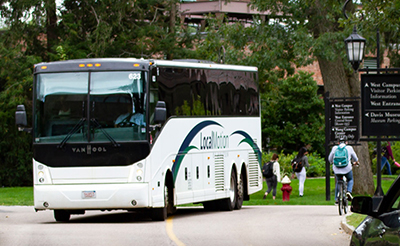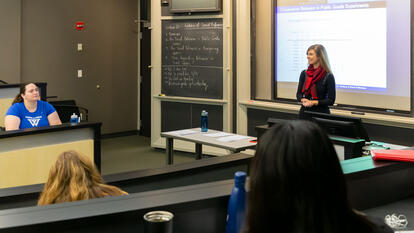Students Help Wellesley Improve Its Shuttle Service

At the start of the school year, Wellesley introduced a new bus service—Local Motion of Boston—to transport students between the campus and points in Cambridge and Boston seven days a week.
At first, students were frustrated by unanticipated schedule changes and crowded buses. But thanks to an ongoing student-administration partnership that is working to improve this vital transportation link, the service is moving forward.
Celine Christory ’21 started a Facebook petition September 2 after she became aware of the early problems. About 230 students weighed in with comments over the next two days, she said.
“The feedback helped, and we feel that our input has been received and our voices were and are being heard,” said Christory, who communicated with the Transportation Services Office. “I think it’s great that they made such an effort to engage us.”

Local Motion, which operates a fleet of more than 120 vehicles, links Wellesley’s campus to MIT and to cultural,recreational, and entertainment venues in Boston. The Exchange bus runs during the week from Wellesley to MIT with stops in between. The Senate bus runs to Boston on the weekends. Local Motion will also provide charter bus service for Wellesley athletic teams.
Service was previously provided by another bus company and had been a source of complaints, especially lateness. Earlier this year, Wellesley administrators worked closely with students Lily Mohr ’19 and Hanna Fernley ’20 in discussing recurrent problems that were apparent last year and they have remained a part of the effort to improve service.
In August, Mohr began working with Peter Eastment, director of faculty housing and transportation, after first contacting him about service problems earlier in the school year.
In the current academic year, she is still involved with Easement’s office, helping to write updates for the Wellesley Transportation webpage. She will also serve on the Transportation Advisory Committee.
Local Motion is vital to the Wellesley student experience, she said. “It is essential to have frequent and reliable service to Boston for Wellesley students to access the opportunities available in terms of internships, cross registration, lab opportunities at MIT, organizations and activities,” said Mohr.
Fernley, who began communications with Eastment to report problems last spring via emails, credits student feedback which she says has been the best way to pinpoint problems.
“Transportation schedules are a hard thing to tackle because it is dependent on so many factors like weather and traffic,” she said.
“Honestly the best source of feedback is students. It's been great seeing student involvement with trying to make the schedule as reliable and frequent as possible.”
Bruce Barrows, a spokesman for Local Motion, said the company welcomes the student input. “Thus far our experiences with the students while working through this transitional period have been terrific,” he said. “They have been engaged, informed, helpful, and patient. These women are our customers, their concerns are our concerns, their feedback is crucial to the overall success of the transportation program.”



